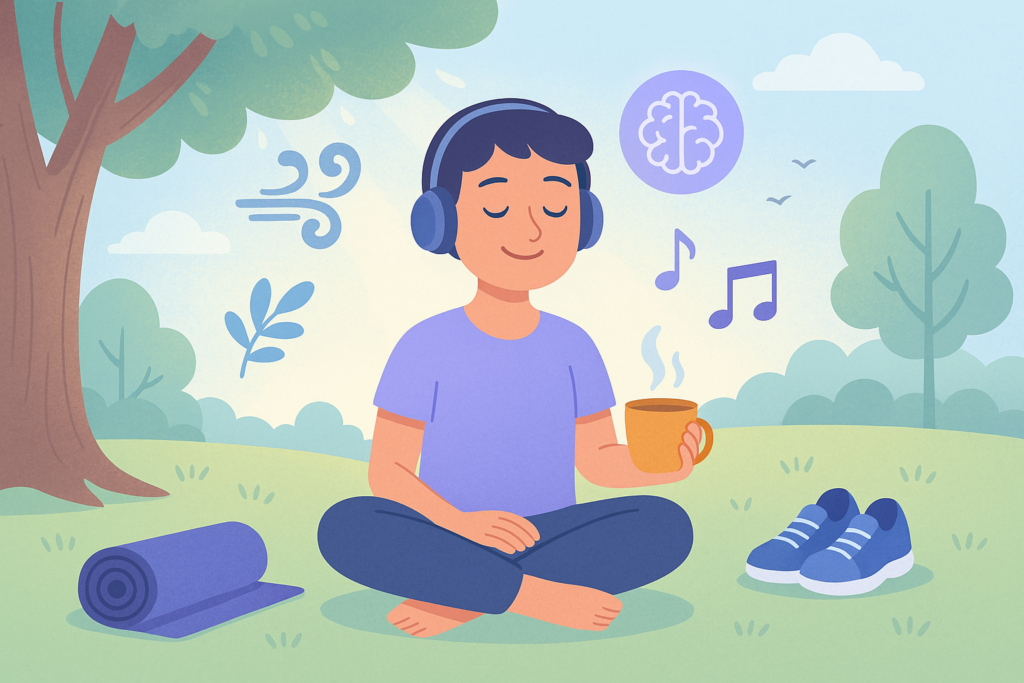Ever thought about how small changes could make a big difference in your health and happiness? Healthy living isn’t about extreme diets or long workouts. It’s about adding simple, lasting habits that boost your wellness.
These habits are not just trends. They can change your life, making it better for your body and mind.
In this article, you’ll learn how small changes can make a big impact on your wellbeing. We’ll cover nutrition, exercise, managing stress, and staying connected with others. Each area is key to your health journey. So, are you ready to see how healthy living habits can change your life?
Understanding Healthy Living Habits
Healthy living habits are more than one thing. They are a set of consistent practices that make your life better. These habits are key to your daily routine and greatly impact your wellbeing. Knowing what they are and why they matter can help you live a healthier life.
What Are Healthy Living Habits?
Healthy living habits include many actions and behaviors that improve your health and life quality. They include:
- Balanced nutrition and mindful eating practices
- Regular physical activity tailored to your preferences
- Sufficient sleep and effective stress management techniques
These habits are the base of a successful health journey. Each one helps your physical and mental health, showing how important wellbeing is in your life.
Why They Matter for Your Wellbeing
Healthy living habits are important for your wellbeing. They improve your physical health and mental clarity. A daily routine filled with these habits can lead to:
- Lower risks of chronic diseases
- Improved mood and self-esteem
- Increased energy levels and productivity
Adding these habits to your life can make your life more vibrant and fulfilling.
Nutrition: Fueling Your Body Right
Eating the right foods is key to feeling good. A balanced diet boosts your energy, strengthens your immune system, and lifts your mood. It’s all about variety and quality, making sure you eat a range of foods.
Balanced Diet Essentials
A balanced diet has many parts that work together for your health. Eating fruits, veggies, whole grains, and lean proteins is important. Try to have a colorful plate to get different vitamins and minerals. Each food group helps your body work well.
Superfoods to Include in Your Meals
Superfoods are packed with nutrients to make your meals better. Berries, leafy greens, nuts, and seeds are great choices. They’re full of antioxidants, vitamins, and healthy fats. Adding superfoods to your diet can make you feel more alive and full of energy.
Hydration: The Key to Optimal Health
Drinking enough water is vital for your health. It helps with digestion, circulation, and thinking clearly. Men should drink about 15.5 cups and women 11.5 cups of water a day. Staying hydrated keeps your energy up and helps your brain work better.

Physical Activity: Moving Towards Wellness
Regular exercise is key for better physical and mental health. Many think only intense workouts help, but any movement is good. Adding exercise to your day can lift your mood, cut stress, and increase energy.
Benefits of Regular Exercise
Regular activity offers many benefits beyond fitness. It can improve heart health, strengthen bones, and tone muscles. Exercise also sharpens the mind and stabilizes emotions, leading to a more balanced life. Even short, regular workouts can lead to better sleep and a sense of achievement.
Finding Activities You Enjoy
Choosing fun activities is key to sticking with exercise. Whether it’s dancing, hiking, cycling, or yoga, pick what you like. Enjoyable activities make exercise a fun habit, not a task. Try different exercises until you find your favorites.
Setting Realistic Fitness Goals
Setting realistic goals is essential for lasting success. Aim for achievable milestones that help you reach your big goals. These goals keep you motivated and help you feel accomplished. Break down big goals into smaller steps and celebrate your progress.
| Goal Type | Example | Time Frame |
|---|---|---|
| Short-term Goal | Walk 10 minutes daily | 1 week |
| Medium-term Goal | Attend a weekly yoga class | 1 month |
| Long-term Goal | Run a 5K | 3 months |

Quality Sleep: Resting for Success
Getting quality sleep is key for your health and happiness. Sleep is vital for your mood, brain function, and body health. Not enough sleep can lead to obesity, heart disease, and stress.
By focusing on quality sleep and good sleep habits, you can improve your life. This makes a big difference in how you feel and function.
Importance of a Good Night’s Sleep
A good night’s sleep is essential for your mind and body. It helps your body repair and your brain clean out toxins. This can prevent neurological diseases.
Quality sleep boosts creativity, problem-solving, and emotional balance. Learn more about sleep health here.
Tips for Better Sleep Hygiene
Improving your sleep hygiene is a great step. Here are some tips to help:
- Stick to a regular sleep schedule.
- Have a calming bedtime routine, like reading or meditation.
- Make your bedroom dark, quiet, and cool.
- Stay away from screens for at least an hour before bed.
- Don’t eat heavy meals or drink caffeine close to bedtime.
Using these tips can make your sleep better and highlight the role of sleep in your life. Better sleep habits lead to better health and a stronger mind. Start these changes and see how they improve your life.

Stress Management: Finding Your Calm
Managing stress is key to a healthier life. In today’s fast world, knowing what stresses you is vital. This knowledge helps you find ways to relax and care for your wellbeing.
Identifying Your Stressors
Start by figuring out what stresses you. It could be work, family, or money issues. Keeping a journal helps track your stress. It shows you what makes you anxious.
Effective Relaxation Techniques
Using relaxation techniques daily can lower stress. Try deep breathing or yoga for quick relief. Nature and hobbies like painting or gardening also help calm your mind and emotions.
The Role of Mindfulness in Reducing Stress
Mindfulness is key in managing stress. Meditation and deep breathing help you notice your thoughts and feelings. This awareness helps you handle stress better. Adding mindfulness to your day builds resilience against stress.

Social Connections: Enhancing Relationships
Creating and nurturing social connections is key for your well-being. Being part of a supportive community makes life richer. It encourages healthier habits and positive interactions. This section will show you how to build such a community and the health benefits of relationships.
Building a Supportive Community
To foster a supportive community, consider these approaches:
- Join local clubs or interest groups that resonate with your passions.
- Participate in volunteer work, where you meet people dedicated to common causes.
- Connect with neighbors and engage in community events to forge bonds.
- Utilize social media wisely to maintain connections and discover new friends.
The Impact of Social Interactions on Health
Research shows the health benefits of relationships. Social connections can:
- Boost your mood and reduce feelings of loneliness.
- Support mental health by decreasing anxiety and depression levels.
- Enhance physical health through increased motivation to participate in activities.
- Lead to longevity, as strong social ties are linked to a longer life expectancy.
Mindful Living: Being Present
Choosing a mindful lifestyle can greatly improve your life. It teaches you to live in the moment, fully experiencing life. A great way to start is with a daily gratitude practice.
Practicing Gratitude Daily
Adding a daily gratitude practice to your routine can change your outlook. Just write down three things you’re thankful for each day. This simple act boosts positivity and helps you appreciate the little things.
The Power of Meditation and Reflection
Meditation does more than just relax you. It clears your mind and lowers stress. Regular meditation builds emotional strength and self-awareness. Combining it with gratitude makes for a well-rounded, mindful life.
Avoiding Unhealthy Habits
Recognizing unhealthy habits is key to better well-being. You might not know the harmful patterns affecting you. Issues like too much snacking, sitting too much, and poor work-life balance harm your health. Knowing these habits lets you start making positive changes.
Identifying Common Harmful Patterns
Being aware of unhealthy habits is critical. Common problems include:
- Eating too much junk food
- Sitting or being inactive for long hours
- Poor sleep habits
- Ignoring personal time for relaxation
Seeing these habits in your life is the first step to change.
Strategies to Replace Bad Habits with Good Ones
Switching to a healthier lifestyle means replacing bad habits with good ones. Try these strategies for health:
- Choose fruits and nuts over processed snacks.
- Take short walks during breaks.
- Develop a bedtime routine for better sleep.
- Do relaxing activities like reading or yoga instead of screens.
- Set realistic goals, focusing on one change at a time.
Using these strategies can help you move towards a healthier lifestyle.
Creating Your Healthy Living Plan
Creating a healthy living plan is a powerful step towards better health. Start by setting clear, achievable health goals. These goals should have both short-term and long-term targets.
For example, a short-term goal might be to eat more vegetables. A long-term goal could be to always eat a balanced diet. This ensures your diet and exercise work together for your health.
After setting your goals, it’s important to track your progress. Use a journal, mobile apps, or other tools to do this. Tracking your progress keeps you motivated and on track.
Looking back at your progress shows where you’re doing well and where you might need to improve. This helps you adjust your plan as needed.
Remember to celebrate your successes, no matter how small. Celebrating your achievements boosts your motivation to keep going. By rewarding your progress, you create a positive environment for your wellness journey.



